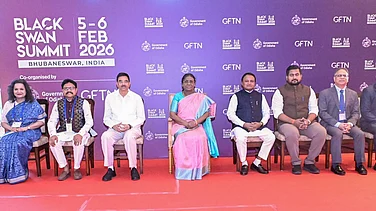India’s relation with China underwent a drastic change in 2020 when the two neighbours engaged in border skirmishes. Around the same time, the central government had issued ‘Press Note 3’ that increased scrutiny over Chinese foreign direct investment (FDI) in India. This made it difficult for prominent Chinese companies such as phone makers Xiaomi and Oppo to operate in India.
The Modi government followed it up with bans on Chinese internet applications such as TikTok and WeChat. Now, the finance ministry wants the Centre to reconsider its aggressive position on Chinese investments in the country.
In the Economic Survey 2024 tabled in the parliament by Finance Minister Nirmala Sitharaman today, promotion of Chinese FDI is cited as a path towards improving domestic know-how and integrating the country in global value chains.
“To boost Indian manufacturing and plug India into the global supply chain, it is inevitable that India plugs itself into China's supply chain,” it says.
Cannot Avoid China
India is not the only country that developed hostile trade relations with China in the recent past. Many developed and developing economies find themselves in different phases of a global phenomenon known as ‘China Plus One’ (China+1).
The rising cost of doing business in China, disruptions caused by Covid-19, and China’s antagonism towards the US have resulted in various global companies de-risking itself from China’s manufacturing prowess. India, too, has tried to benefit from this process by positioning itself as a manufacturing destination for many such companies.
While India did manage to attract increased attention from value creators such as Apple’s supplier ecosystem, other countries such as Vietnam and Mexico have benefitted more from the void created by China+1 policy.
Now, the economic survey suggests that India should facilitate more Chinese investments in the country to make the most of the global phenomenon.
It says: “Will China plus one result in a total movement of trading relations away from China? This may not be the case. Take, for example, nations like Mexico, Vietnam, Taiwan and Korea, which were direct beneficiaries of the US’s trade diversion from China. Even while these nations increased their share of exports to the US, they also displayed a concomitant rise in Chinese FDI. Therefore, the world cannot completely look past China, even as it pursues China plus one.”
Futility of Trade Restrictions
The Economic Survey cites a study done by Bank for International Settlement (BIS) to show the ineffectiveness of protectionist tariffs against China’s mastery over large-scale manufacturing.
Vietnam, which has improved its standing in the global manufacturing landscape ever since China+1, has improved its trade with both US and China in the past few years. Between 2017 and 2023, US imports from Vietnam more than doubled from $46 billion to $114 billion. At the same time, Vietnam’s imports from China jumped from $58 billion to $111 billion. Similar is the case with Mexico.
“...the US remains reliant on Chinese inputs. In fact, the rise in trade through Mexico and Vietnam is a result of Chinese firms re-routing their supply through these countries (or by locating themselves in these countries),” the economic survey notes.
Dominance over Energy Transition
In critical areas such as green energy and electric vehicles (EVs), China’s dominance is so overwhelming that it is hard to move ahead with technology transition without taking China’s help.
In the case of India’s renewable energy programme, its dependence on imported raw materials puts it in a “vulnerable” position. Globally, China enjoys 60 per cent dominance in sourcing rare earth minerals and 79 per cent in graphite. In terms of processing these critical materials, China is an unchallenged winner.
The survey asks the Modi government to “recognise and deal with challenges posed by dependence on China for critical minerals, which are crucial raw materials needed for E-Mobility and renewable energy generation.”
Way Forward
Shein was one of the more popular Chinese companies that was banned by India in 2020. But recent reports suggest that the fashion retailer might make its way back to the Indian market via a licensing deal with Mukesh Ambani’s Reliance Retail.
Similarly, JSW Group recently took a controlling stake in Chinese EV maker MG Motors’ operations in India. If the suggestions made by Economic Survey 2024 are taken forward, it is likely that we will get to see more of such deals wherein Chinese capital and goods will enter India in its own desi avatar.
At present, China accounts for only 0.37 per cent ($2.5 billion) share of total FDI equity inflow reported in India from April 2000 to March 2024.
Now, the ball is in PM Modi's court to strike a balance between Chinese investments, India's global trade interests and concerns around territorial integrity.
































